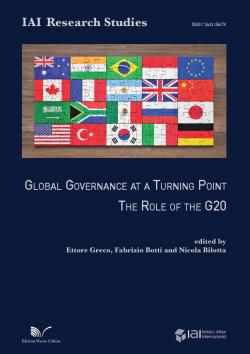Global Governance at a Turning Point. The Role of the G20
Questo libro raccoglie i contributi di importanti esperti internazionali su come nel 2021 la Presidenza italiana del G20 può portare avanti una rinnovata agenda di governance globale. La pandemia di Covid-19 ha colpito tutte le nazione del mondo, evidenziando quanto siamo interconnessi a livello globale. Per mitigare gli effetti sanitari, sociali ed economici della crisi del Covid-19 il mondo ha bisogno di risposte globali efficaci. La cooperazione multilaterale si è trovata però a navigare in acque tempestose sia prima che dopo la pandemia di Covid-19. Il G20 può svolgere un ruolo chiave nel rivitalizzare la cooperazione multilaterale, promuovendo nuove modalità e nuovi strumenti per affrontare le sfide globali. In questo contesto, gli autori esplorano quattro aree chiave che richiederebbero un nuovo coordinamento globale: il commercio globale, la digitalizzazione, i modelli demografici e l’economia circolare.
Volume realizzato nell'ambito del progetto “Il ruolo del G20 nella promozione della global governance: sfide e priorità della presidenza italiana del 2021”.
-
Dati bibliografici
Roma, Nuova Cultura, giugno 2021, 203 p. -
Numero
5 -
ISBN/ISSN/DOI:
978-88-3365-333-4
List of Contributors, p. 7
List of Abbreviations, p. 9-12
Foreword, by Lorenzo Kamel, p. 13-14
Introduction – Reframing Goals and Priorities of the G20 Agenda, by Ettore Greco, p. 15-23
1. The Role of the G20 in Promoting Global Governance: Challenges and Opportunities for the Italian Presidency in 2021, by Nicola Bilotta and Fabrizio Botti, p. 25-37
1. Introduction and summary
2. Origin and evolution of the G20
3. Changes in the geopolitical environment and domestic policy attitudes
4. Proposals for reform
Conclusion
References
2. WTO Reform: The Role of the G20, by Axel Berger and Clara Brandi, p. 39-69
1. The state of international trade cooperation
2. Key issues and the positions of major WTO members
3. The role of the G20
Conclusions
3. The G20’s Work on the Digital Economy and the Future of Work: International Context, Progress and the Way Ahead, by Paul Twomey, p 71-99
1. International cooperation
2. Initiatives undertaken in the G20
3. The impact of Covid-19
4. The potential role of the G20
References
4. The Challenges of an Ageing Society, by Paola Subacchi, p. 101-113
1. The state of international cooperation
2. Initiatives within the G20 context
3. Ageing: An agenda for the G20
Conclusion
References
5. The G20: Accelerating the Transition to a Global Circular Economy, by Martin Charter and Ichin Cheng, p. 115-154
1. The impact of Covid-19
2. Conceptual and definitional issues
3. CE plans launched by the EU and national governments around the world
4. CE policy instruments
5. The state of play of CE international initiatives
6. CE initiatives within the G20 framework
Conclusions and recommendations
Appendices
References
Appendix: Chapter 2, Tables 2-8, p. 155-203




